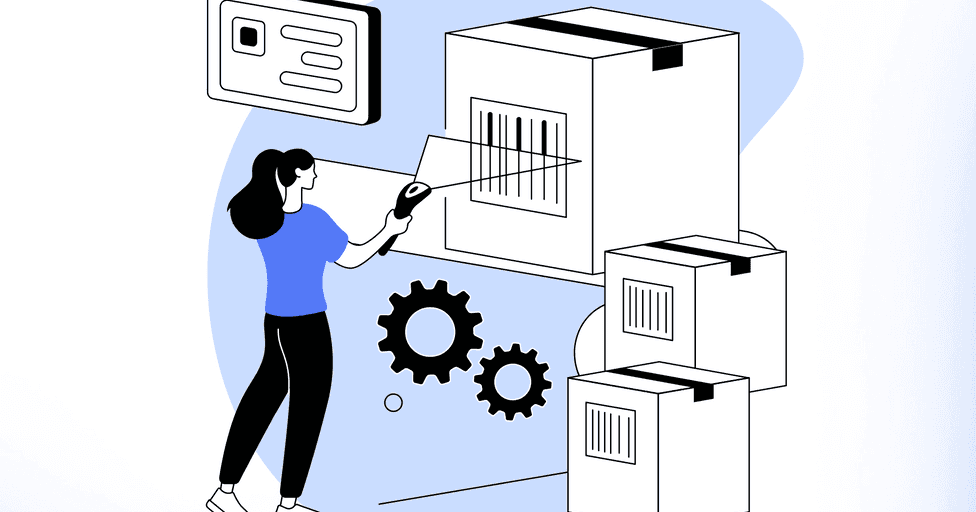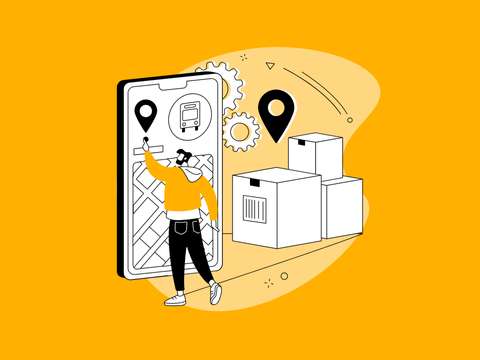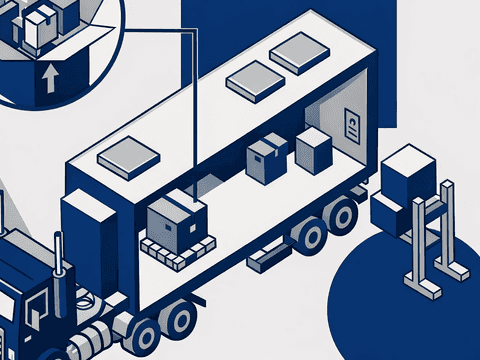TL,DR
- Cut eCommerce return costs fast. Automate labels, carrier selection, and validation rules with the right returns management software to reduce cost per return and free your team from manual work
- Boost loyalty with better UX. Let shoppers self-manage returns through a branded returns platform with instant exchanges, store credit, and real-time tracking—turning frustration into repeat purchases
- Avoid tools that hold you back. Many returns solutions lack true automation or require extra integrations, leading to hidden costs and limiting your store’s potential to scale
- Outvio turns returns into revenue. Unlike basic tools, Outvio is a complete eCommerce returns system that promotes exchanges, upgrades, and new purchases
Choosing the best return management solution for your eCommerce business is crucial to ensuring a cost-effective and customer-centric process. However, the decision between different tool, platforms and software can be complex and requires time and research.
To assist you in this process, we have leveraged our industry knowledge to compile the most comprehensive list of the best direct-to-consumer returns software, platforms, and solutions.
The best solutions for processing returns in 2026
- Outvio for end-to-end automation and cost recovery
- Narvar for branded return journeys
- Return Bear for packaging-free drop-offs
- Loop Returns for Shopify automation
- Rich Returns for simple Shopify portal
- ReturnGo for mid-market RMA automation
- Return Logic for affordable label automation
- AfterShip Returns for tracking-led returns
- Happy Returns for physical return hubs
- Yayloh for fashion return workflows
- Optoro for inventory recommerce optimization
- Rebound for international returns handling
- ReverseLogix for reverse logistics control
- Reveni for instant refund advances
- Retino for warranty-focused returns
- Return Prime for beginner Shopify stores
- 12Returns for rules-based automation
- Returnista for label printing validation
- Returnless for UK portal automation
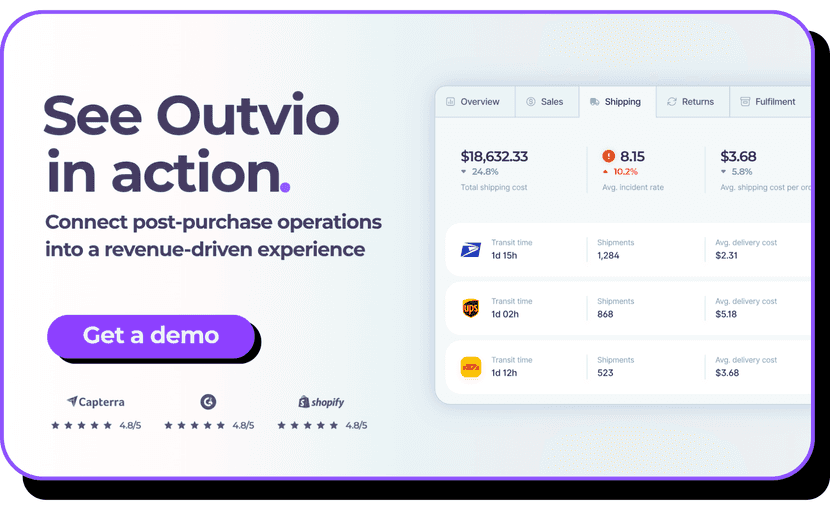
Why do you need returns management solution in eCommerce?
Returns are a natural part of the ecommerce business, but without proper management, they can become a significant obstacle to profitability and customer satisfaction.
According to data from Axios, the cost of returning a $50 item can reach $33 for an ecommerce business. This means that, in addition to losing a sale, the return itself can cause you to lose money, negatively impacting your bottom line.
Moreover, the average return rate for e-commerce orders is 18.1%, significantly higher than the 8-10% rate for in-store purchases, highlighting the scale of the challenge.
Implementing returns management software in your ecommerce business allows you to streamline and simplify this process for both you and your customers.
This translates into a direct impact on the profitability of your business, as it minimizes costs and resources. Additionally, apparel and footwear returns, which can reach up to 40%, demonstrate the need for specialized management systems to handle high-volume returns efficiently.
Benefits of integrating the returns management software:
- Improves customer satisfaction: a fast, simple, and transparent returns process generates a positive experience that builds customer loyalty. In fact, 81% of consumers prefer to self-manage their purchases and returns through specialized portals
- Strengthens your brand reputation: offering a flexible and efficient returns policy positions you as a reliable company committed to customer satisfaction.
- Reduces logistical and operational costs: automating returns management tasks optimizes your team's time and resources, potentially saving significant operational costs, which can be as high as $21-$46 per return
- Increases sales and revenue: a positive returns experience can turn an unsatisfied customer into a repeat buyer, driving future revenue.
- Gain valuable insights into your customers' behavior: analyzing the reasons for returns allows you to identify areas for improvement in your product or delivery service, enabling better decision-making for your business.
Recommend to read
Unlock latest strategies and insights about return management by reading our comprehensive guide.
19 best return management solutions for eCommerce
1. Outvio
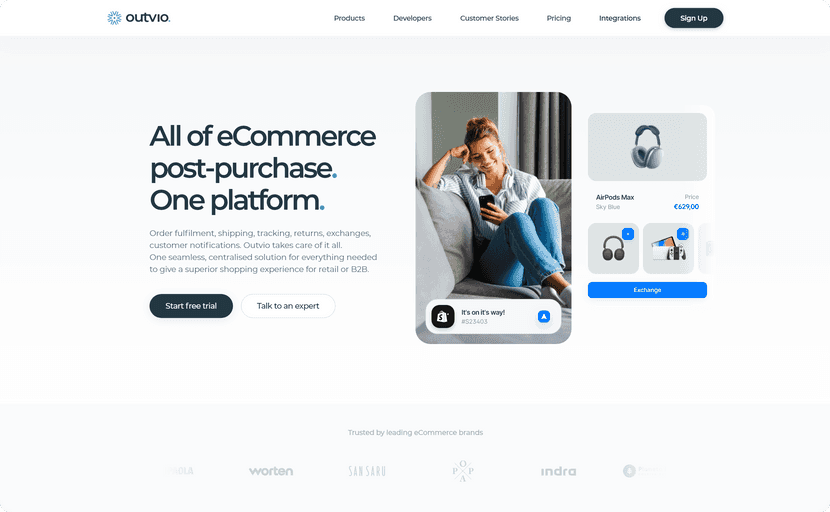
G2 Ratings: 4.8
Outvio provides a comprehensive solution for returns management, designed to streamline operations, enhance customer satisfaction, and optimize returns processes.
By integrating directly with carriers and offering customizable tools, Outvio enables businesses to handle both domestic and international returns seamlessly. The platform also includes advanced features to turn returns into revenue through its product recommendation algorithm, allowing businesses to promote exchanges and additional purchases.
Built-in customer support functionality ensures efficient handling of customer inquiries and enhances the overall post-purchase experience.
Beyond returns management, Outvio functions as an all-in-one software that supports every aspect of eCommerce logistics and customer service. It goes beyond handling returns to enable full shipping management, incident resolution, automated notifications, ticketing, chat, and more.
Key features include:
- Sync directly with over 80 carriers for streamlined shipping and returns label creation.
- Automate the entire returns flow with flexible rules, custom return reasons, and exception handling. Create local and international return labels effortlessly.
- Encourage exchanges over returns, offer store credit, and enable higher-value exchanges. Customers can make additional purchases directly through the returns portal with built-in payment options.
- Use the built-in support desk to manage inquiries related to returns, shipments, and more.
- Streamline order processing across multiple sales channels and warehouses with preconfigured shipping rules and automated workflows.
- Offer customers a branded tracking experience for both deliveries and returns, improving transparency and engagement.
- Keep customers informed with updates via email, SMS, and WhatsApp.
- Automatically resolve courier-related issues to ensure smooth post-purchase operations.
2. Narvar
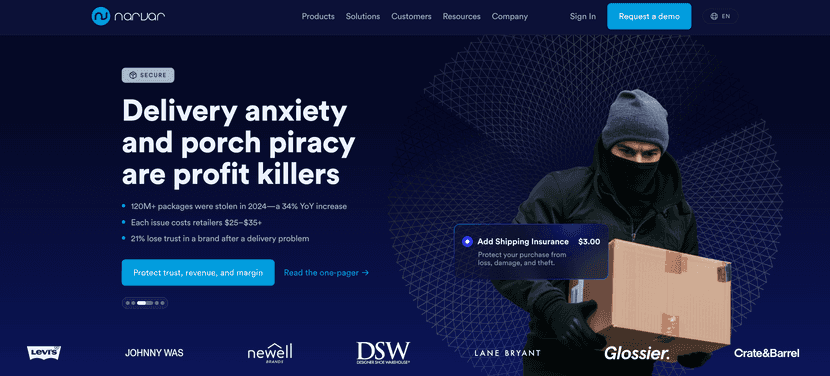
G2 Ratings: 4.3
Narvar is a returns management platform designed to manage the post-purchase process. Shoppers can initiate returns through an interface that provides instructions and offers options such as exchanges, store credits, or refunds. Narvar allows businesses to customize the return process to match their brand, including messaging and design elements. Its analytics features offer data to support operational decisions.
Features
- Customizable return journey
- Multi-option return management (exchanges, refunds, store credits)
- Branded communication and notifications
- Analytics tools
3. Return Bear
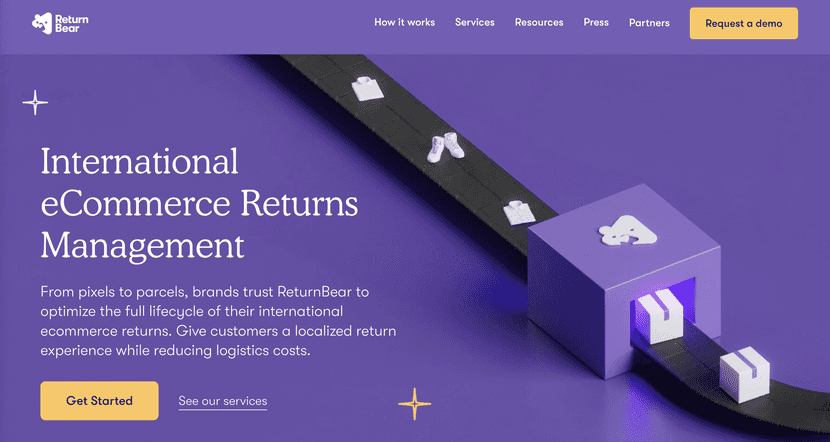
G2 Ratings: 4.3
Return Bear provides a solution for managing returns with options for drop-off points and an online portal for initiating the process. Customers can return items without packaging, and the platform integrates with existing systems to handle operations. It includes features aimed at reducing packaging and processing times.
Features
- Drop-off return options
- Packaging-free returns
- Integration with existing systems
- Logistics optimization
4. Loop Returns
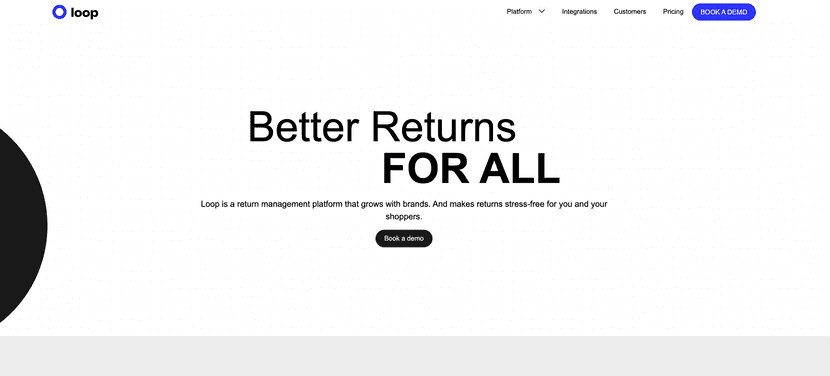
G2 Ratings: 4.3
Loop Returns is a comprehensive returns management solution. Buyers can conveniently initiate return processes through a digital portal. It boasts compelling features such as product exchanges, analytics, and automation rules. In terms of customization, it allows the incorporation of the business logo into the return process and enables the modification of text fonts.
Features
- Returns portal
- Notification system
- Automation rules
- Exchange management
5. Rich Returns

G2 Ratings: 3.3
Rich Returns is a returns management platform specifically designed for Shopify merchants. It improves the returns process for both customers and businesses by making it simpler and more efficient to process returns.
Features
- Return portal for customers
- Provides reports
- Generates return authorizations
6. ReturnGo
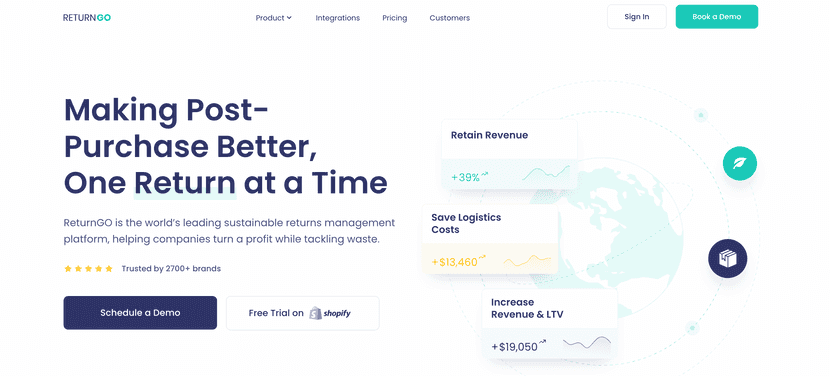
G2 Ratings: 4.8
ReturnGo is a returns and reverse logistics management software system specifically designed for mid-sized online stores. It helps you automate RMA requests and streamline their resolution process through various features.
Features
- Automated returns portal
- Notification system
- Analytics
7. Return Logic
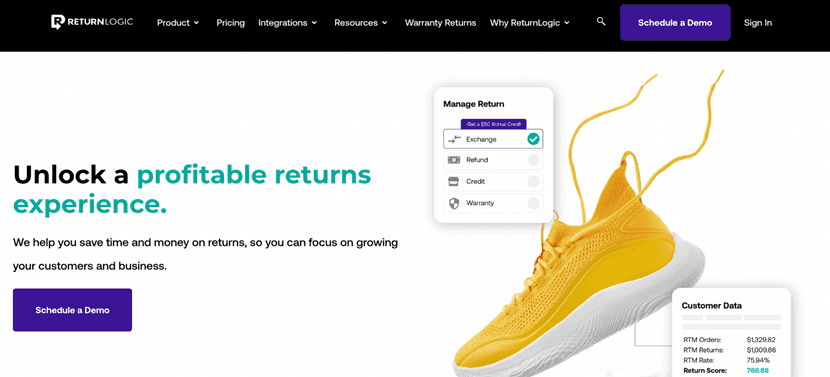
G2 Ratings: 4.7
Return Logic is a return management software for eCommerce. It helps businesses automate and streamline their return process, from generating return labels to processing refunds. Overall, Return Logic is a good option for eCommerce businesses that are looking for an affordable and reliable return management solution. `
Features
- Return Portal
- Rates with USPS
- Automation functionalities
8. AfterShip Returns
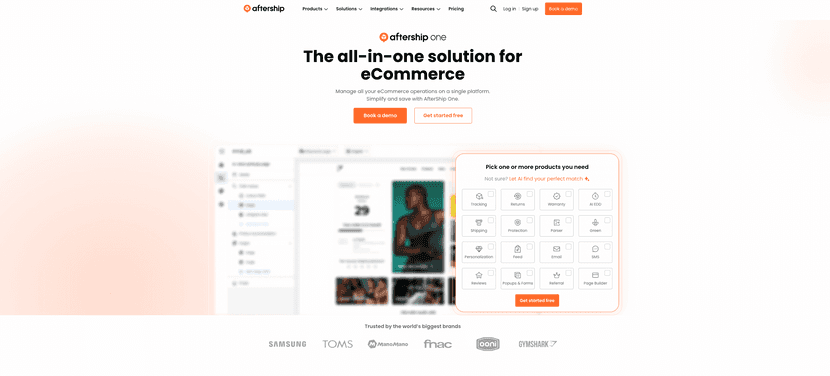
G2 Ratings: 4.3
Aftership Returns is a tool that provides tracking services and automated status updates for customer returns. It is part of the Aftership brand, and additional components need to be seamlessly integrated for a complete experience.
Features
- Integration of additional modules
- In-box return label service
- Returns portal
9. Happy Returns
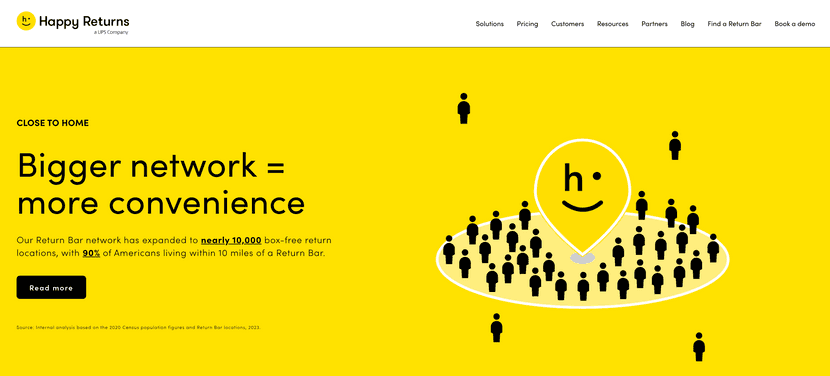
G2 Ratings: 4.8
Happy Returns is renowned for its extensive network of physical return hubs, offering customers the convenience of in-person product returns. This eCommerce return management software is a product of PayPal and has gained widespread popularity in the United States for its innovative return system.
Features
- Efficient manual handling of returns
- Robust language localization capabilities
- physical collection points
10. Yayloh
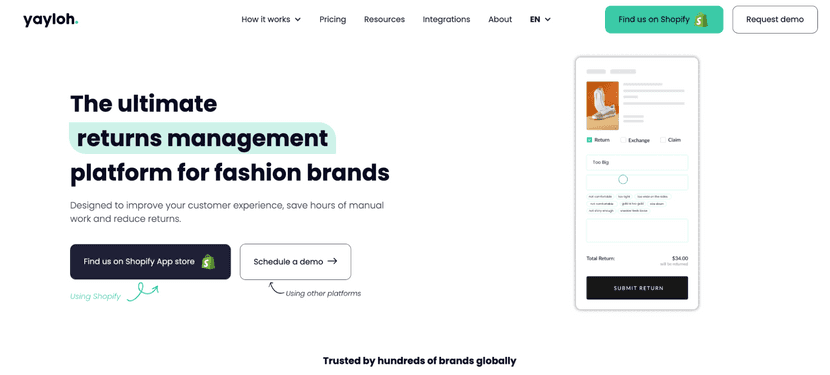
G2 Ratings: 4.6
Yayloh is a returns management platform highly popular among fashion eCommerce businesses. It boasts a set of intriguing features such as a returns portal, notifications, and automation rules. On the downside, we find its analytics dashboard somewhat limited, as it only includes 20 KPIs.
Features
- Returns Portal
- Analytics
- Integration with Sales Channels
11. Optoro
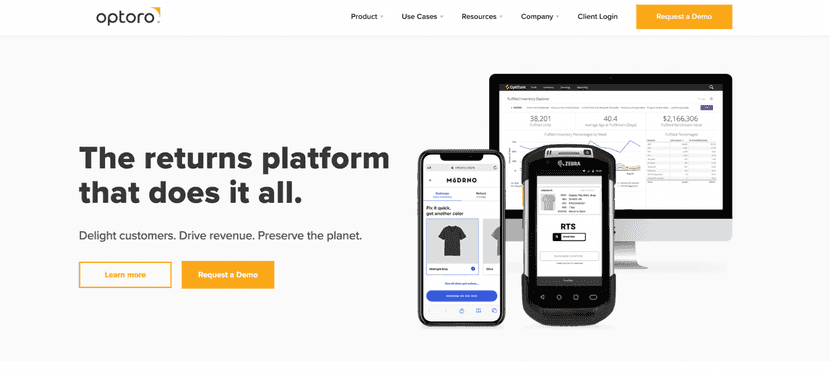
G2 Ratings: 4.3
Optoro is an effective returns management software when it comes to handling eCommerce inventories. You can seamlessly integrate various sales channels, including marketplaces, and process RMA requests with greater ease. The tool features an automated portal and notification system to enhance the buyer's experience.
Features
- Returns Portal
- Automations
- RMA Request Evaluation
12. Rebound
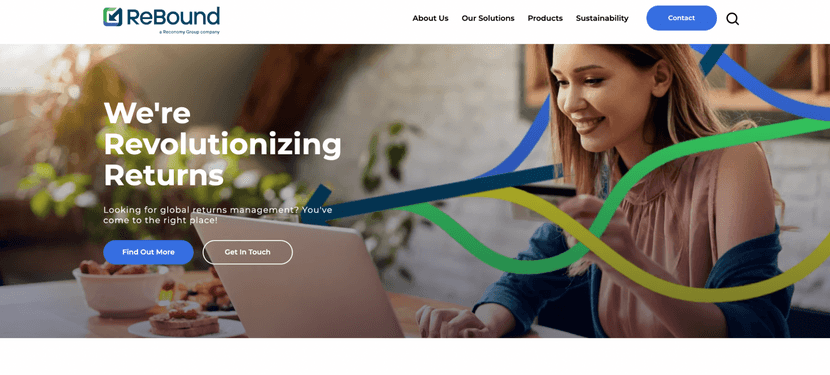
G2 Ratings: 0
Rebound is one of the top returns management software options when it comes to handling international returns. Its returns portal is straightforward to navigate, capable of processing requests with various carriers. You can translate the return process seamlessly. Additionally, it features an analytics system and tracking service.
Features
- Intuitive Interface
- Return Request Import
- Tracking and Notifications
13. ReverseLogix
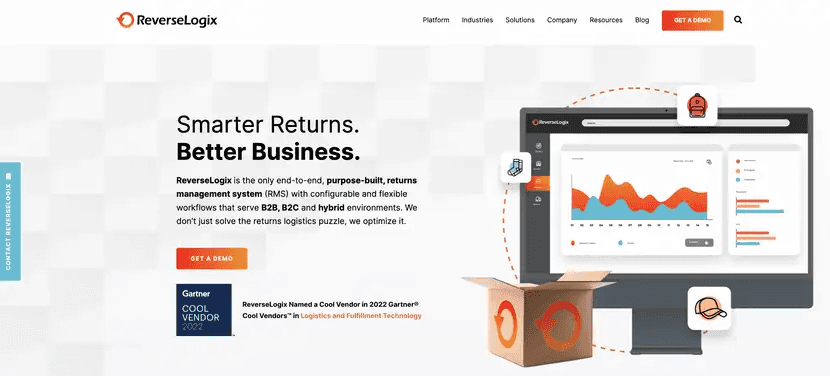
G2 Ratings: 4.4
ReverseLogix is a reverse logistics platform with built-in software. It is a particularly valuable tool for overseeing the logistical aspecto of return management, as well as the recycling or reconditioning of items.
Features
- Carrier Management
- Sync with Stock and Inventories
- Monitoring of the Reverse Supply Chain
14. Reveni
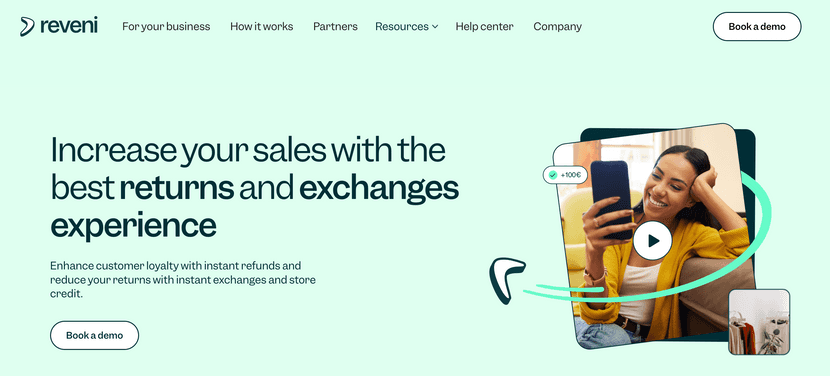
G2 Ratings: 0
Reveni is a returns software specializing in refund advances. The solution facilitates prompt reimbursement to customers by advancing payments to stores. These payments are to be returned with interest by the online merchant. It also allows for the import and processing of return requests and printing of the corresponding label.
Features
- Return Portal
- Refund Advance
- Instant Refund
15. Retino
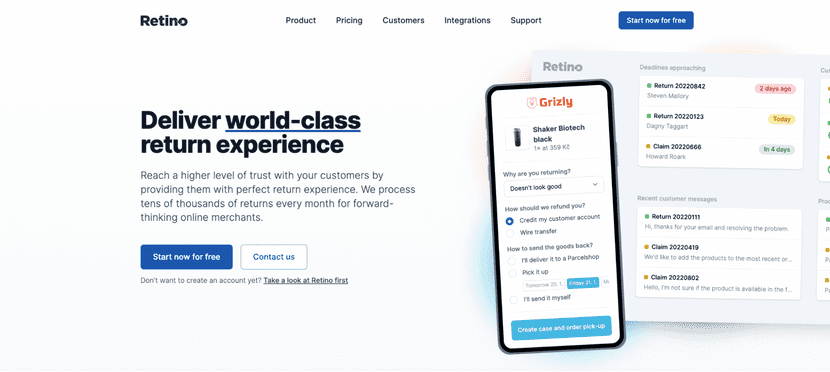
G2 Ratings: 4.9
Retino is a eCommerce returns solution designed for novice stores, specializing in warranty management. Your customer can initiate returns through their portal, choosing the carrier and pickup location that suits them best. While it integrates with some carriers, you may need to connect your own through an external aggregator if you wish to work with them.
Features
- Analytics
- Refund Processing
- Self-Service Portal
16. Return Prime
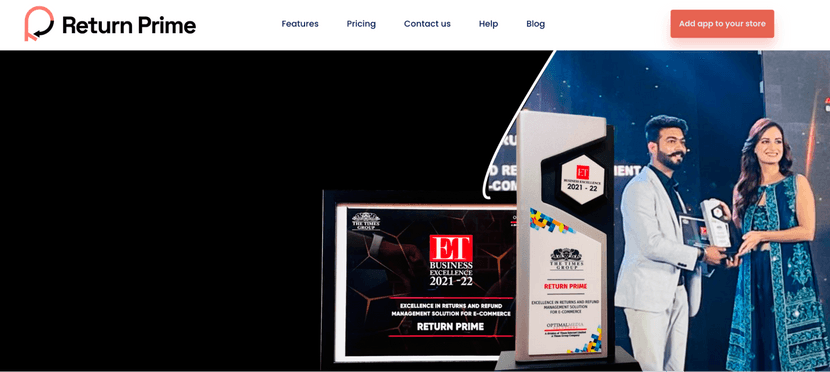
G2 Ratings: 5
Return Prime is another application specialized in returns management for Shopify stores. One of the strengths of this solution is its 24/7 support service and a multilingual returns process. Although it is somewhat lacking in features, you can connect it with other systems and technological software. Recommended if you have just created your first store on Shopify and need to manage few returns in foreign countries.
Features
- Returns portal
- Returns tracking
- Multilingual
17. 12Returns
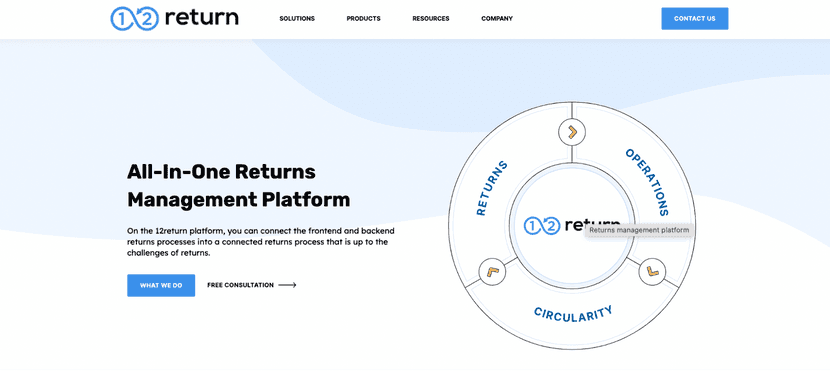
G2 Ratings: 4
12Returns provides a comprehensive returns management system, complete with a portal, rules, and notifications. This ensures you can offer your customers a higher quality experience. However, it may not have integration with a sufficient number of carriers, and you might need to use an external aggregator.
Features
- Notifications
- Automation Rules
- Customer Portal
18. Returnista
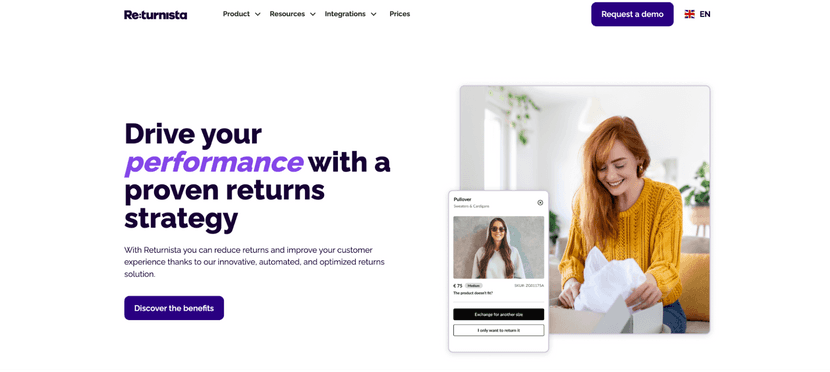
G2 Ratings: 0
Returnista is a return label printing and request validation software designed for online stores. Buyers can print the return label and include it in the package. Additionally, you can schedule pickups with carriers to streamline reverse shipments.
Feature
- Order Importation
- Label Printing
- Analytics System
19. Returnless
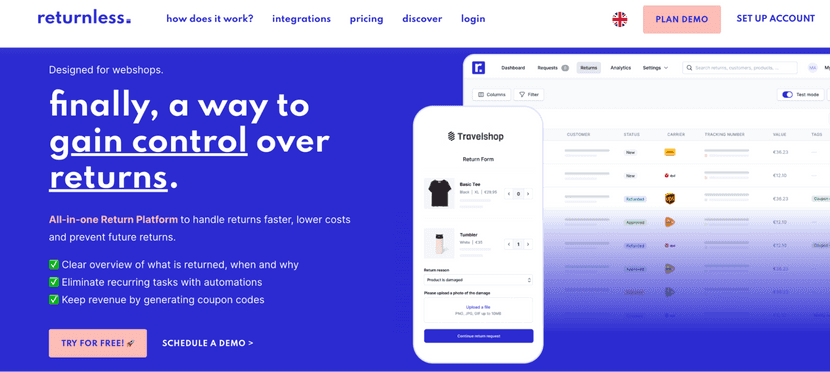
G2 Ratings: 0
Returnless provides an intuitive interface for you to effectively manage your business's return requests. It offers a returns portal, automation rules, and returns analytics. The software can also be synchronized with your content manager and your fulfillment provider. It has a strong presence in the UK and the Netherlands.
Features
- Returns portal
- Return order import
- Refund automation
Key Features for a successful returns management
- Automatic RMA Management: The software should automatically manage return requests, allowing you to view conditions and make decisions in real time.
- Return Label Printing: The software should allow you to quickly and easily print return labels for customers.
- Integration between Carriers and eCommerce: It is crucial to choose software with pre-existing integrations to avoid additional developments. Lack of integration may require external connectors.
- Automation Rules: Rules allow you to process returns based on specific criteria, such as discounts, carrier assignment, and validation based on return reasons.
- Customizable Returns Portal: Offer customers a convenient process where they can enter their credentials, choose products, and follow instructions to manage returns.
- Automatic Exchanges: Favoring exchanges over returns allows you to retain revenue and stimulate additional sales. The software should allow free product changes.
- Product Recommendations: Offer attractive deals during the return process for customers to add new items to the cart, increasing the transaction value.
- Return Tracking and Notifications: Informing the buyer about the progress of a return provides confidence and minimizes their anxiety. This is essential for improving the perception of your business once the transaction is complete.
If you choose incomplete returns management software, you will likely need to integrate additional solutions to fill the gaps, which will increase the total cost of the initial proposal.
What's the difference between returns solution and shipping platform with returns functionality?
The proliferation of SaaS tools and technological solutions makes it increasingly difficult to differentiate one software from another. In eCommerce management, it is vital to distinguish between shipping software with returns processing capabilities and truly specialized software.
Truly specialized returns management software must guarantee total flexibility in returns management, including:
- Product exchanges for other catalog items
- Store credit coupon strategies
- Instantaneous collection of the price difference for the exchanged product
It is very common for label printing tools to promise comprehensive returns management (this reddit thread is an example) and due to the opacity of the sector, many businesses end up signing annual contracts, only to realize that the tool does not meet their needs. This can be extremely negative, as it indefinitely paralyzes the growth of your online store.
Outvio is one of the few platforms capable of guaranteeing total, effective, and seamless processing of all the post-purchase stages. Before signing a contract with any alternative, we strongly recommend you contact our experts for a free demo.
How to choose the best direct-to-consumer eCommerce return software
When it comes to making a well-informed decision in choosing the best eCommerce return solution, take the following guidance into account:
Hidden costs
There exist two categories of eCommerce return management softwares: those capable of generating shipping labels independently and those that necessitate integration with third-party resources.
Selecting an application that demands integration can potentially increase your expenses since you'll essentially be paying for two separate services. Conversely, a comprehensive, standalone application typically proves to be more cost-efficient and effective.
Scalability
An application with limited functionalities carries a substantial opportunity cost. As your business expands and your current tool becomes inadequate, you might find yourself needing to transition to a more suitable application.
Furthermore, a lack of features could potentially deter customers from exploring valuable options. For instance, opting for a tool that lacks 100% automated exchanges, such as Sendcloud, might encourage many customers to opt for direct refunds.
After considering these insights, you can now determine which returns solution software aligns best with the requirements of your store. Keep the aforementioned tips in mind to ensure the selection of a genuinely valuable tool.
Pro Tip:
The most effective way to determine whether a software delivers on its promises is by examining its integration portfolio. If you find that a shipping or returns tool has integration with a similar alternative, it's likely they are incomplete and do not fulfill their promised functionalities.
How to monetize returns management platform: advanced use cases
While the primary goal of returns management software is to provide an automated and cost-effective returns process for your store, these tools have evolved into sales channels.
Effective strategies you can implement by integrating the returns management software:
- Make the most of the software's capabilities to display carrier options based on the customer's location, while minimizing shipping costs.
- Use the software's analytics features to identify which products have a higher return rate. Implement specific strategies to reduce these returns and improve customer satisfaction.
- Personalize return conditions based on the reason. For example, you can ask your customers to upload a photo of the product when selecting a return for damage and minimize fraud cases.
- Incentivize customers who have made returns by offering them discount coupons for their next purchase. This not only fosters customer loyalty but also drives future sales.
- Customize return processing fees based on criteria such as the number of items to be returned, the customer, the selected method, and others. This allows you to tailor policies to your business needs.
- Promote products throughout the order or return process based on your customer's purchase criteria.
- Connect with carriers worldwide without investing tens of thousands of euros in integrations.
Please note that you can only perform the following practices if you integrate the latest returns management technology, such as Outvio's software. Request a demo from our experts.
Prices and subscription costs for 2026
| Software | Price | Tool Description |
|---|---|---|
| Outvio | Custom | AI-powered all-in-one optimization: shipping, exchanges, returns, marketing, carriers, and customer support |
| Narvar | Custom Pricing | Return management software with branded return journeys and multi-option return handling |
| Return Bear | Custom Pricing | Return management platform offering drop-off points and packaging-free returns with logistics optimization |
| Loop Returns | Starting at $29 per month | Automation of return requests through a digital portal |
| Rich Returns | Starting at $19 per month | Integrable portal and manual returns request automation in Shopify |
| ReturnGo | Starting at $121 per month | Automation of return requests through a digital portal |
| ReturnLogic | Starting at $299 per month | Automation of return requests through a digital portal |
| AfterShip Returns | Starting at $19 per month | Tracking tool with a specific module for returns management |
| Happy Returns | Custom Pricing | Software with physical pick-up points in the US territory |
| Yayloh | Custom Pricing | RMA request automation for online clothing businesses |
| Optoro | Custom Pricing | Return software with inventory management functionalities |
| Rebound | Custom Pricing | Return management software for international shipping |
| ReverseLogix | Custom Pricing | Software for reverse supply chain logistics management |
| Reveni | Custom Pricing | Instant refunds processing and advances for stores and customers |
| Retino | Starting at $15 per month | Automation of return requests through a digital portal |
| Return Prime | Starting at $20 per month | Application specialized in returns management for Shopify stores |
| 12 Return | Custom Pricing | Automation of return requests through a digital portal |
| Returnista | Starting at $99 per month | Return management solution with digital portal and label printing functionalities |
| Returnless | Starting at $69 per month | Return management software with a strong presence in the UK and the Netherlands |
Outvio, the best product return solution for eCommerce
Popa, a fast-growing fashion brand, used Outvio to improve its eCommerce return management. With Outvio’s returns platform, customers could return or exchange items through a simple self-service portal.
The impact? Faster returns, fewer support tickets, and around $200,000 in extra revenue.
Outvio gave Popa full control of the returns process, with automation, real-time tracking, and a branded experience that kept customers happy.
Our customers are really happy with the return process. In many cases, they forget they’re returning a product and end up spending more than they initially intended to return. It's a great improvement for us." — Patricia Gabarrón, Marketing Director at Popa Brand
Discover why Outvio is the best returns solution for eCommerce and retail businesses. Book a demo today.

